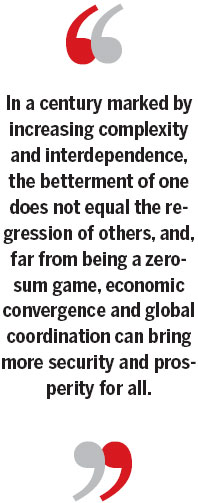Xi's mission to put the West at ease
Updated: 2013-03-22 09:02
By David Gosset (China Daily)
|
|||||||||||
In russia and in africa, the chinese president needs to weed out seeds of fear
The insight of the Greek historian Thucydides on the Peloponnesian conflict is often quoted in reference to the relations between China and the West: "Athens' rise and the alarm it inspired in Lacedaemon made war inevitable."
In the context of the 21st century global politics, as the Chinese renaissance affirms itself as the world's major factor of change, the apprehension it generates around China and, beyond, in the West, has to be defeated before it induces the follies of confrontation.
On the occasion of Xi Jinping's first visit abroad as the president of the People's Republic of China, a trip organized around a meeting in Moscow with Russian President Vladimir Putin and the Fifth BRICS Summit in South Africa, while observers will certainly insist on the collective rise of the non-Western world, the new Chinese leader could also use this moment of international exposure to send long term messages of cooperation and inclusiveness apt to address the growing Western anxiety. Whatever the itinerary, Xi's inaugural foreign trip, at the opposite of being divisive, will display the strongest possible support for a more cohesive international community.
 |
Ten years ago, Russia was also the first foreign destination of the then Chinese president Hu Jintao, but, within a decade, the world's distribution of power has been profoundly modified, Xi governs a renewed "Middle Country" within a multipolar system in which the South-South interactions matter as much as the North-North relations.
At the beginning of the Hu era, the combined economy of Brazil, Russia, India, China and South Africa was $2.4 trillion (1.6 trillion euros) or 20 percent of the US economy. Today, Xi Jinping operates in a world where the $14.7 trillion economy of the BRICS - is almost equal to the GDP of the US.
The dynamics of the United Nations Security Council are also affected by the evolving relative weight of its five permanent members. Ten years ago, the aggregate of the US, French and British economies was more than 10 times the Sino-Russian economic bloc, today, it is only two times bigger, and the Chinese and Russian strategists are well aware that by 2020 the two groupings will have equivalent economic value.
In the introduction to The Rise and Fall of the Great Powers British scholar Paul Kennedy resurrected the 17th century Austrian author Philip von Hornigk: "Whether a nation be today mighty and rich or not depends not on the abundance or security of its power and riches, but principally on whether its neighbors possess more or less of it."
If it is obvious that the comprehensive might of the West has been diminishing in comparison with the rapid rise of others, it remains, by many indicators, constant, or even increases in absolute terms.
However, in spite of the West's strengths and capabilities, its decreasing comparative power generates a perception of decline and an irrational fear of China reminiscent of the somber pattern described by Thucydides.
The reassuring Chinese principle of "peaceful rise" indicates that Beijing does not ignore the risks induced by such a Western perception, but, it is only through a persistent foreign policy of inclusiveness and, beyond, by entering in substantial cooperation with the West that fear can be contained.
In a century marked by increasing complexity and interdependence, the betterment of one does not equal the regression of others, and, far from being a zero-sum game, economic convergence and global coordination can bring more security and prosperity for all.
In his report to the 18th Party Congress Hu Jintao declared: "We should raise awareness about human beings sharing a common destiny."
Xi Jinping will have to show to the world the extent of China's benevolent intentions, the concrete meaning of his country's universalism and, from Moscow or Durban, address the West's sentiment of fear.
The author is director of the Academia Sinica Europaea at the China Europe International Business School, Shanghai, Beijing & Accra, and founder of the Euro-China Forum. The views do not necessarily reflect those of China Daily.
(China Daily 03/22/2013 page10)
Today's Top News
List of approved GM food clarified
ID checks for express deliveries in Guangdong
Govt to expand elderly care
University asks freshmen to sign suicide disclaimer
Tibet gears up for new climbing season
Media asked to promote Sino-Indian ties
Shots fired at Washington Navy Yard
Minimum growth rate set at 7%
Hot Topics
Lunar probe , China growth forecasts, Emission rules get tougher, China seen through 'colored lens', International board,
Editor's Picks

|

|

|

|

|

|
















